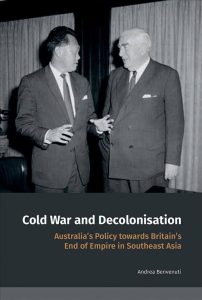- Author
- Book reviewer
- Subjects
- Book reviews, History - post WWII
- Tags
-
- RAN Ships
- None noted.
- Publication
- December 2018 edition of the Naval Historical Review (all rights reserved)
Cold War and Decolonisation: Australia’s policy towards Britain’s end of empire in Southeast Asia, by Andrea Benvenuti, National University of Singapore Press, Singapore, 2017, paperback, 279 pp., available Asia Book Room, Canberra at $A 42 or NUS Press, Singapore at SGD $38.
The author is a lecturer in international relations at the School of Social Sciences and International Studies with the University of New South Wales. The book is earmarked for an academic niche but it services a higher realm. Many Australians, Malaysians and Singaporeans will be the beneficiaries of his research and analysis.

His account interests me for several reasons, both personal and professional. I served in the Far East Strategic Reserve (FESR) in the first half of 1967. He styles it the Commonwealth Strategic Reserve (CSR) which indubitably it was. As a teenage midshipman, serving in a RAN destroyer (HMAS Duchess), it left an indelible impression on me. Dr Benvenuti has reminded us that Australia, with its allies, contributed to the military success in countering the threat to the foundling states of Malaysia and Singapore.
The book is well presented with an agreeable division of chapters which attenuate the diplomatic manoeuvring between the major players; Britain, Australia, New Zealand, Malaysia, Singapore and Brunei. Indonesia, as the principal antagonist in ‘confronting’ the former British possessions, has to be studied during a tense period, under an errant leader, when Sukarno and his ill-governed people lost control of their proud history. The author is alive to their quest for self-development and how the then Malaya (1957) and Singapore (1959) had to arrive at their nationhood. Communism was a regional threat and these two nascent states had to be defended, lest they drift into an arc of instability, their existence being subverted by hostile foreign powers.
Cold War is an ambitious project and it largely succeeds. It remains a workable book so do try and understand that span of events, were you a Malaysian or Singaporean. Independence is not born overnight. In many cases, it is an unrelenting struggle replete with internal politics as local political elites jockey for power once a colonial power bequeaths them the wherewithal to do so, as they retreat from empire.
The author skilfully describes and explains Asian sensitivities in a post-colonial world. Singapore and Malaya/Malaysia (1963) sought security guarantees from its Commonwealth allies during its political evolution in their early years. Britain had its own problems, defence estimates being one. The UK could no longer afford to bank roll a sizeable military profile in the Far East. Savings had to be made but the question was timing. Australia recognised and responded to those regional insecurities, which matched our own, and we ably reinforced their security yearnings.
Reviewed by Michael Fogarty, a former naval officer and retired diplomat




